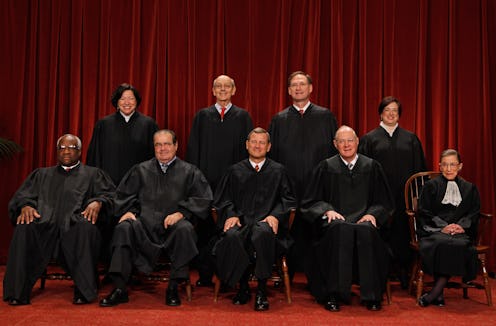News
How Will The Justices Vote On Gay Marriage?
Within the next few weeks, we should have an answer about whether same-sex couples can finally get married in every state of the union. The Supreme Court is due to cast its final word about marriage equality this summer, but it is difficult to tell what the verdict will finally be and how each justice will vote on gay marriage. Luckily, the justices' individual opinions from previous cases are still available through the Supreme Court.
However, a justice's past record is not always an indicator of how he or she will vote in the future. The court has been involved in hearing for months on this issue, and one of the many persuasive attorneys could have made a difference. Justices' personal politics are not always relevant either. Judges might be personally for gay marriage but do not believe in the Supreme Court's power to make such a call.
Some of the current justices have a record of being extremely secretive on future rulings and wanting to remain independent from their personal beliefs. While justices such as Ruth Bader Ginsburg are famous for expressing their opinions clearly, others are closed off about how they might rule. Clarence Thomas is literally quiet and has gone years before without speaking out loud in a court argument, according to The New York Times.
All that's truly before the public are hints. While speculation abounds, here are quotes from each of the Supreme Court justices on gay marriage:
John Roberts
In Hollingsworth v. Perry, California's gay marriage ban came into question, but the Supreme Court dismissed the case in a 5-4 ruling because the court did not have the authority to rule on this issue, according to the SCOTUSblog. Chief Justice Roberts said in his majority opinion:
This is an essential limit on our power: It ensures that we act as judges, and do not engage in policymaking properly left to elected representatives.
Antonin Scalia
Justice Scalia wrote the dissenting opinion in United States v. Windsor 2013 case that ended the Defense of Marriage Act, which allowed states to decline to recognize same-sex marriages granted in other states, according to Time. He did not believe that the court had the authority to make the gay marriage call, similar to the argument Roberts made.
This case is about power in several respects. It is about the power of our people to govern themselves, and the power of this Court to pronounce the law. Today’s opinion aggrandizes the latter, with the predictable consequence of diminishing the former. We have no power to decide this case.
Samuel Alito
Justice Alito compared same-sex marriage to polygamous marriage. He asked the question of how the Supreme Court could deny legalizing polygamous marriage if it legalized gay marriage.
Well, what if there’s no — these are four people, two men and two women, it’s not— it’s not the sort of polygamous relationship, polygamous marriages that existed in other societies and still exist in some societies today. And let’s say they’re all consenting adults, highly educated. They’re all lawyers. What would be the ground under — under the logic of the decision you would like us to hand down in this case? What would be the logic of denying them the same right?
Sonya Sotomayor
According to The New York Times, Justice Sotomayor asked the same question that seemingly every educated person has been wondering:
How does withholding marriage from one group — same-sex couples — increase the value to the other group?
Anthony Kennedy
Justice Kennedy wrote this statement in the United States v. Windsor case. He argued for gay marriage, which hints to a pro-equality vote from him this summer.
The question is whether the resulting injury and indignity is a deprivation of an essential part of the liberty protected by the Fifth Amendment, since what New York treats as alike the federal law deems unlike by a law designed to injure the same class the State seeks to protect. New York’s actions were a proper exercise of its sovereign authority. They reflect both the community’s considered perspective on the historical roots of the institution of marriage and its evolving understanding of the meaning of equality.
Ruth Bader Ginsburg
The traditionally liberal justice and social media meme star argued with opponents of same-sex marriage at an April hearing, according to The Guardian. Ginsburg continuously proves that she's always the smartest person in the room.
All of the incentives, all of the benefits that marriage affords would still be available, so you’re not taking away anything from heterosexual couples. They would have the very same incentive to marry, all the benefits that come with marriage that they do now.
Elena Kagan
Justice Kagan responded to an argument that same-sex marriage should not be legal because the couple cannot procreate, according to Business Insider. Not only did Kagan vote against the Defense of Marriage Act, she even officiated a gay wedding, according to The Huffington Post.
Suppose a State said, "Because we think that the focus of marriage really should be on procreation, we are not going to give marriage licenses anymore to any couple where both people are over the age of 55." Would that be constitutional?
Clarence Thomas
Thomas twisted legal brains with his statement in a dissent on a case that allowed gay marriages to proceed in Alabama. His words imply that the justices have already made up their minds and that gay marriage will be legalized:
This acquiescence may well be seen as a signal of the Court’s intended resolution of that question. This is not the proper way to discharge our . . . responsibilities.
Stephen Breyer
Breyer has not written a separate opinion on gay marriage, but he did say, according to The New York Times:
Marriage is about as basic a right as there is.
Images: Getty Images (9)
